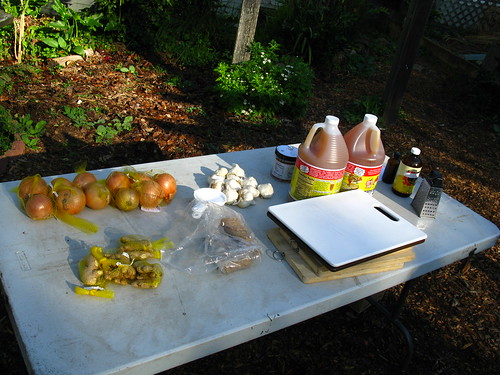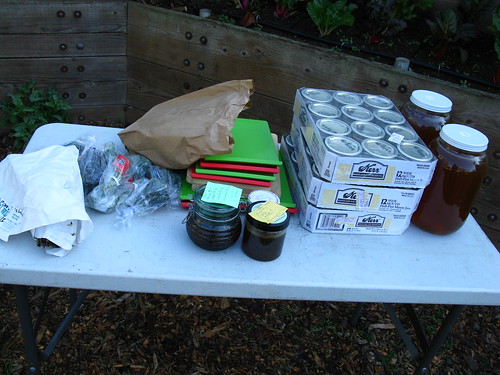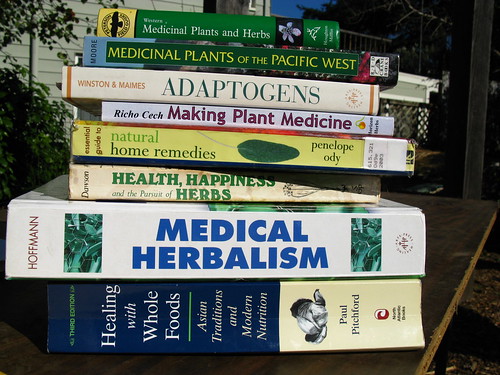What can I say without sounding like a jerk. As a scientist you learn to put up with, or accept, a certain amount of pseudoscience and scientific illiteracy from the general world. Sometimes letting things go is a compromise you make in order to get by and get along. I admit to making that compromise from time to time, but I don't think it's a virtue.
Sometimes you want to reach out and enlighten. That works best one on one. Much harder to do in front of a group of people you don't know, especially when the teachable subjects are many and various. Nobody likes a know-it-all. Moreover, when you're paying to take a class, you don't want to teach it too, right? That's only reasonable.
In all honesty, I do not regard herbal "medicine" as medicine. Simply having, or allegedly having, medicinal properties does not make something a medicine. Medicine is contingent on the current state of knowledge. A miracle drug in one age is a dangerous, antiquated therapy in another. We never have perfect knowledge, we never will.
I will gladly take any benefit from the quinine in my gin and tonic. If my blueberries have cancer-fighting antioxidants, so much the better. I can hardly function in the morning without a cup of coffee. But am I going to call those things medicine? Not with any seriousness. You can if you want to, but why would you? I guess you would if it's part of your tradition, or worldview. So it is that "herbal medicine" is about more than just botanical extracts and plant preparations.
Above all else, the instructor wanted us to think of herbal medicine-making as a way to learn more about plants. Well, what gardener doesn't want to learn more about plants. If she had stopped there I would be fine. But she and the class made and exchanged several scientific-sounding claims that seemed to have little if any basis in fact. If you're going to talk about qi and chakras, why mess it up with pH and cancer?
I think herbal medicine is not for me. I thought about responding to a few points that I found particularly irksome, but I'm just going to do the blog post now.
We prepared two herbal remedies--a vinegar for colds and a honey for sore throats. This is the set-up for the vinegar.

To make it, add chopped garlic and onion and pepper flakes to raw apple vinegar. Cover and let steep several weeks in a cool, dark place. The instructor brought in some already-made material to try. It was hot and tingly. I thought it would be great on a cold cabbage salad.
For the honey:

Add equal amounts of thyme, sage, and mint to honey, steep for several weeks, then filter (heat it in double boiler until it runs, and pour it through a strainer). Also quite tasty, but cool and smooth as opposed to the hot, pungent vinegar.
If this subject excites you, here are some books you might be interested in:

I'm just going to leave it at that.

9 comments:
Chuck,
I agree with your take on this subject. I think there's a lot of malarky, hocus-pocus and snake-oil in this crock some folks like to stew and brew their various mixtures in, but I know people who swear certain potions really work. To me it goes back to mind over matter and if someone believes strongly enough that such-and-such has medicinal and curative properties then it might truly "work" for them..or seem to. Just look at the effect wine and wafers have on deeply religious believers at Communion. As for me, I'm much too sceptical.
Jon at Mississippi Garden
I think you need to explain yourself a little better. This is the one on one opportunity with a wide audience.
Define "medicine" for a start.
I know you are not saying that the chemicals found in some plants don't have medicinal properties and can't be turned into medicine.
Was it the new age approach that turned you off, instead of coming from a scientific peer reviewed study approach?
Don't throw the thyme, sage, and mint out with the honey water because you found this instructor was teaching from the wrong chakra.
I'm not sure the comparison to "wine and wafers" is fair because mainstream Christians don't claim any sort of physical effects from taking Communion. Better examples would be other forms of alternative medicines, like acupuncture or chiropractic. I find these things interesting in a folksy sort of way and they may even have a place when it comes to quality of life, but I'm really bothered when people I care about rely on them to treat real illnesses. You want to show them the error of their ways, but it's not easy to convince people when they truly believe in these things. I tend to keep my mouth shut as well. Good post, by the way. I could see this turning into quite a debate!
I think medicines do need rigorous study. And they need to be current. The mercury-based diuretics from the 50s and 60s are not medicines today; they're poisons.
Vinegar, onions, garlic and pepper flakes are not medicine. That's food. They might make you feel better but so does cognac. I'd rather have cognac. I wonder if cognac is still in the USP. I think it is, actually.
Anyway, it's fine with me if other people want to take herbal medicine and consider it to be actually medicine. It's just not for me.
Hi Chuck, very interesting, this class. I can see how you would be cynical about the use of herbs as medicine as a scientist. But as a gardener, I love knowing about the myths and uses surrounding the herbs and was quite into it a few years ago. Lots of book reading and dried bits in jars and cans all lined up on the shelf. Moth bags and headache bags and bath bags and sleep bags were all big sellers. And tea bags. Medicine, no. But herbs do have uses, even if you are just rubbing some lavender on your bare arms to deter insects. It works.
Frances
Brilliant.
I tend to shy away from shamanistic practices of ritualized miraculous cannibalism as well as the chakra crowd.
So I might want to save and reuse this quote if you don't mind.
"As a scientist you learn to put up with, or accept, a certain amount of pseudoscience and scientific illiteracy from the general world. Sometimes letting things go is a compromise you make in order to get by and get along. I admit to making that compromise from time to time, but I don't think it's a virtue."
O course there are lots of drugs or 'medicins' made from plants: salicilic acid from willow bark; a malaria drug made from Chinese artimesia and lots of other drugs made from plant and even insects found in the rain forest around the world.These drugs are then synthesized in a lab for mass production. But I agree with you that onions, garlic, honey, vinegar etc. are not medicin. A tonic maybe?
Wait! Blueberries and gin are MEDICINE?! Eureka! Another tax deduction! Yay!
I just attended a hike in the Phoenix desert last week, talking about native plants and the way they were historically utilized.
Content was pretty good, and claims were not made, but I flinched every time she said 'they made a tea'
Grrrr, arrrrgh!
Tea is tea.
If it was steeped in water it was an infusion or a tisane.
I did learn that items steeped in alcohol are a tincture.
But TEA. TEA is TEA. And tea only. sigh.
Post a Comment